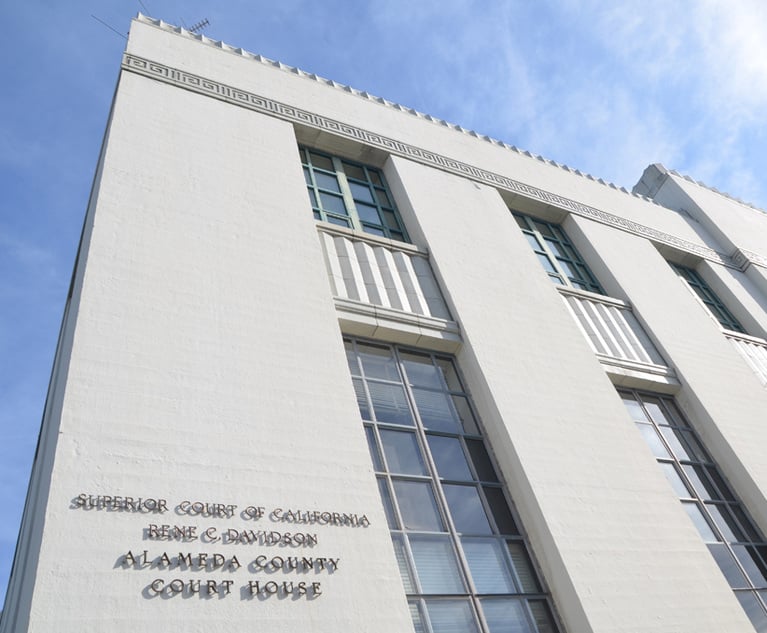Inside the 11th-Hour Maneuvering as Digital Privacy Law Faces Key Votes
Some measures are the subject of ongoing, closed-door negotiations among lawmakers, business groups, privacy advocates and industry lobbyists.
July 02, 2019 at 06:32 PM
4 minute read

With a deadline looming next week to move legislation out of policy committees, the fate of a half-dozen bills aimed at curtailing the reach of the California Consumer Privacy Act remains very much in doubt.
Key bills targeting the landmark data protection law have been assigned to the state Senate Judiciary Committee. But as of Tuesday morning, only two had been placed on the agenda for the committee's July 9 hearing, the panel's last scheduled meeting before the July 10 procedural deadline. The remaining measures are the subject of ongoing, closed-door negotiations among lawmakers, business groups, privacy advocates and industry lobbyists.
One of those bills, AB 25, suffered a political blow last month when the powerful California Labor Federation announced its opposition.The legislation specifies that the Consumer Privacy Act does not apply to information obtained by employers about workers and job applicants.
Mitch Steiger, a California Labor Federation lobbyist, said the organization of 1,200 affiliated unions is concerned the bill's language would condone company monitoring of workers through apps, spyware and other devices without requiring employee access to the information collected.
“We see what we view as very intrusive employer surveillance happening,” Steiger said. “At the least we want to make sure workers have access to that information that's collected about them.”
The labor group registered its opposition late in the legislative process. Steiger said the federation had not been following the bill closely and was only alerted recently about potential problems in the language from other opponents.
“To receive new opposition this far into the process complicates things, especially when we have spent months working with stakeholders on AB 25,” the bill's author, Assemblyman Ed Chau, D-Monterey Park, said in an email. “Yet, I remain committed to finding common ground with all stakeholders where we can.”
Chau continued: “At this time, I intend to move forward with AB 25 and welcome the opportunity to work with labor groups at looking into specific privacy protections that would best benefit employees.”
The bills that would amend the Privacy Act face another hurdle in the Judiciary Committee. Chairwoman Hannah-Beth Jackson, D-Santa Barbara, supported legislation—backed by Attorney General Xavier Becerra—earlier this year to expand the reach of the law by adding a private right of action for consumers. The bill stalled in a fiscal committee, but Jackson is still seen as a major obstacle for those advocates who would like to see the Privacy Act limited in scope.
Jackson declined to comment on the bills coming before her committee.
Amendment backers also face a new potential challenge in the recent reformulation of the Judiciary Committee. Due to the election last month of two new senators, Senate leader Toni Atkins removed two committee members, who likely would have supported Privacy Act limitations, and replaced them with officeholders who have shorter track records on privacy issues.
Watching all of these developments is Alastair Mactaggart, the San Francisco real estate developer who co-authored the Consumer Privacy Act.
 Alastair Mactaggart, San Francisco real estate developer. Photo Illustration: Jason Doiy/ALM
Alastair Mactaggart, San Francisco real estate developer. Photo Illustration: Jason Doiy/ALMMactaggart said this week he only opposes two pending act-amending bills. One, AB 1416, would allow companies to share consumer information with government agencies. The other, AB 846, would exempt retailers who collect data from customer loyalty programs. Both bills have the backing of tech and business groups.
Mactaggart said he expects AB 846 to be amended in a way he can support. As for AB 1416, Mactaggart said he's ready to fight the bill in its current form until it's defeated. The rest of the legislation, including AB 25, he said, he has no problems with.
“Suddenly I'm the person in the middle because you have people who are more strident on both sides,” Mactaggart said.
Mactaggart told The Recorder he's still glad he withdrew his privacy ballot initiative last year in favor of the legislation that's spawned so many proposed amendments. He said he believes the Legislature is best suited to craft privacy laws and “we've held off some bad bills.”
Mactaggart's Californians for Consumer Privacy retains two lobbying firms in Sacramento, and he said he recently commissioned a poll that shows public support has grown for data privacy restrictions he champions.
Asked if he was considering another ballot initiative, Mactaggart said, “At this point, no.”
This content has been archived. It is available through our partners, LexisNexis® and Bloomberg Law.
To view this content, please continue to their sites.
Not a Lexis Subscriber?
Subscribe Now
Not a Bloomberg Law Subscriber?
Subscribe Now
NOT FOR REPRINT
© 2025 ALM Global, LLC, All Rights Reserved. Request academic re-use from www.copyright.com. All other uses, submit a request to [email protected]. For more information visit Asset & Logo Licensing.
You Might Like
View All

Fresh lawsuit hits Oregon city at the heart of Supreme Court ruling on homeless encampments
4 minute read

Trending Stories
- 1Uber Files RICO Suit Against Plaintiff-Side Firms Alleging Fraudulent Injury Claims
- 2The Law Firm Disrupted: Scrutinizing the Elephant More Than the Mouse
- 3Inherent Diminished Value Damages Unavailable to 3rd-Party Claimants, Court Says
- 4Pa. Defense Firm Sued by Client Over Ex-Eagles Player's $43.5M Med Mal Win
- 5Losses Mount at Morris Manning, but Departing Ex-Chair Stays Bullish About His Old Firm's Future
Who Got The Work
J. Brugh Lower of Gibbons has entered an appearance for industrial equipment supplier Devco Corporation in a pending trademark infringement lawsuit. The suit, accusing the defendant of selling knock-off Graco products, was filed Dec. 18 in New Jersey District Court by Rivkin Radler on behalf of Graco Inc. and Graco Minnesota. The case, assigned to U.S. District Judge Zahid N. Quraishi, is 3:24-cv-11294, Graco Inc. et al v. Devco Corporation.
Who Got The Work
Rebecca Maller-Stein and Kent A. Yalowitz of Arnold & Porter Kaye Scholer have entered their appearances for Hanaco Venture Capital and its executives, Lior Prosor and David Frankel, in a pending securities lawsuit. The action, filed on Dec. 24 in New York Southern District Court by Zell, Aron & Co. on behalf of Goldeneye Advisors, accuses the defendants of negligently and fraudulently managing the plaintiff's $1 million investment. The case, assigned to U.S. District Judge Vernon S. Broderick, is 1:24-cv-09918, Goldeneye Advisors, LLC v. Hanaco Venture Capital, Ltd. et al.
Who Got The Work
Attorneys from A&O Shearman has stepped in as defense counsel for Toronto-Dominion Bank and other defendants in a pending securities class action. The suit, filed Dec. 11 in New York Southern District Court by Bleichmar Fonti & Auld, accuses the defendants of concealing the bank's 'pervasive' deficiencies in regards to its compliance with the Bank Secrecy Act and the quality of its anti-money laundering controls. The case, assigned to U.S. District Judge Arun Subramanian, is 1:24-cv-09445, Gonzalez v. The Toronto-Dominion Bank et al.
Who Got The Work
Crown Castle International, a Pennsylvania company providing shared communications infrastructure, has turned to Luke D. Wolf of Gordon Rees Scully Mansukhani to fend off a pending breach-of-contract lawsuit. The court action, filed Nov. 25 in Michigan Eastern District Court by Hooper Hathaway PC on behalf of The Town Residences LLC, accuses Crown Castle of failing to transfer approximately $30,000 in utility payments from T-Mobile in breach of a roof-top lease and assignment agreement. The case, assigned to U.S. District Judge Susan K. Declercq, is 2:24-cv-13131, The Town Residences LLC v. T-Mobile US, Inc. et al.
Who Got The Work
Wilfred P. Coronato and Daniel M. Schwartz of McCarter & English have stepped in as defense counsel to Electrolux Home Products Inc. in a pending product liability lawsuit. The court action, filed Nov. 26 in New York Eastern District Court by Poulos Lopiccolo PC and Nagel Rice LLP on behalf of David Stern, alleges that the defendant's refrigerators’ drawers and shelving repeatedly break and fall apart within months after purchase. The case, assigned to U.S. District Judge Joan M. Azrack, is 2:24-cv-08204, Stern v. Electrolux Home Products, Inc.
Featured Firms
Law Offices of Gary Martin Hays & Associates, P.C.
(470) 294-1674
Law Offices of Mark E. Salomone
(857) 444-6468
Smith & Hassler
(713) 739-1250






